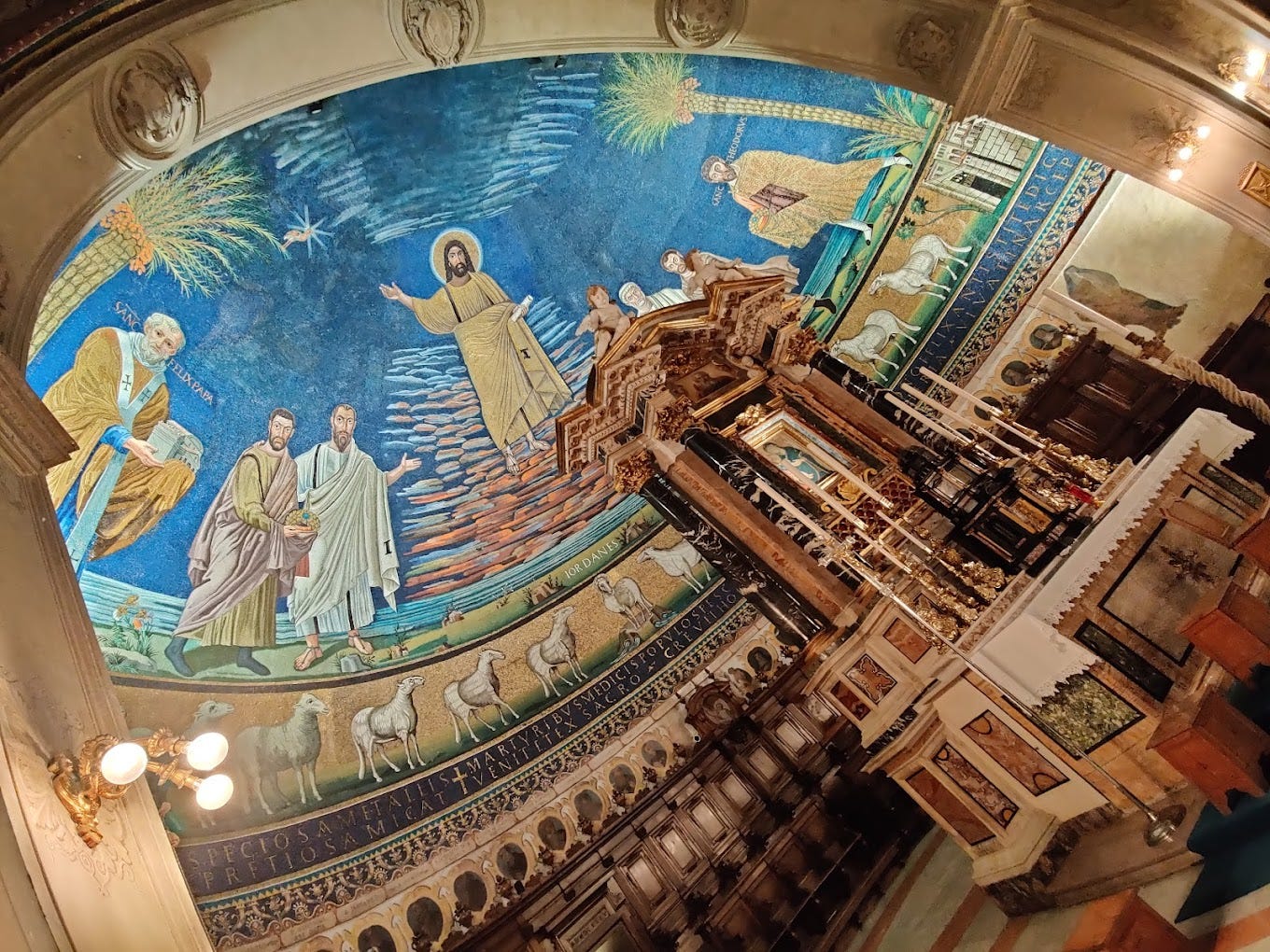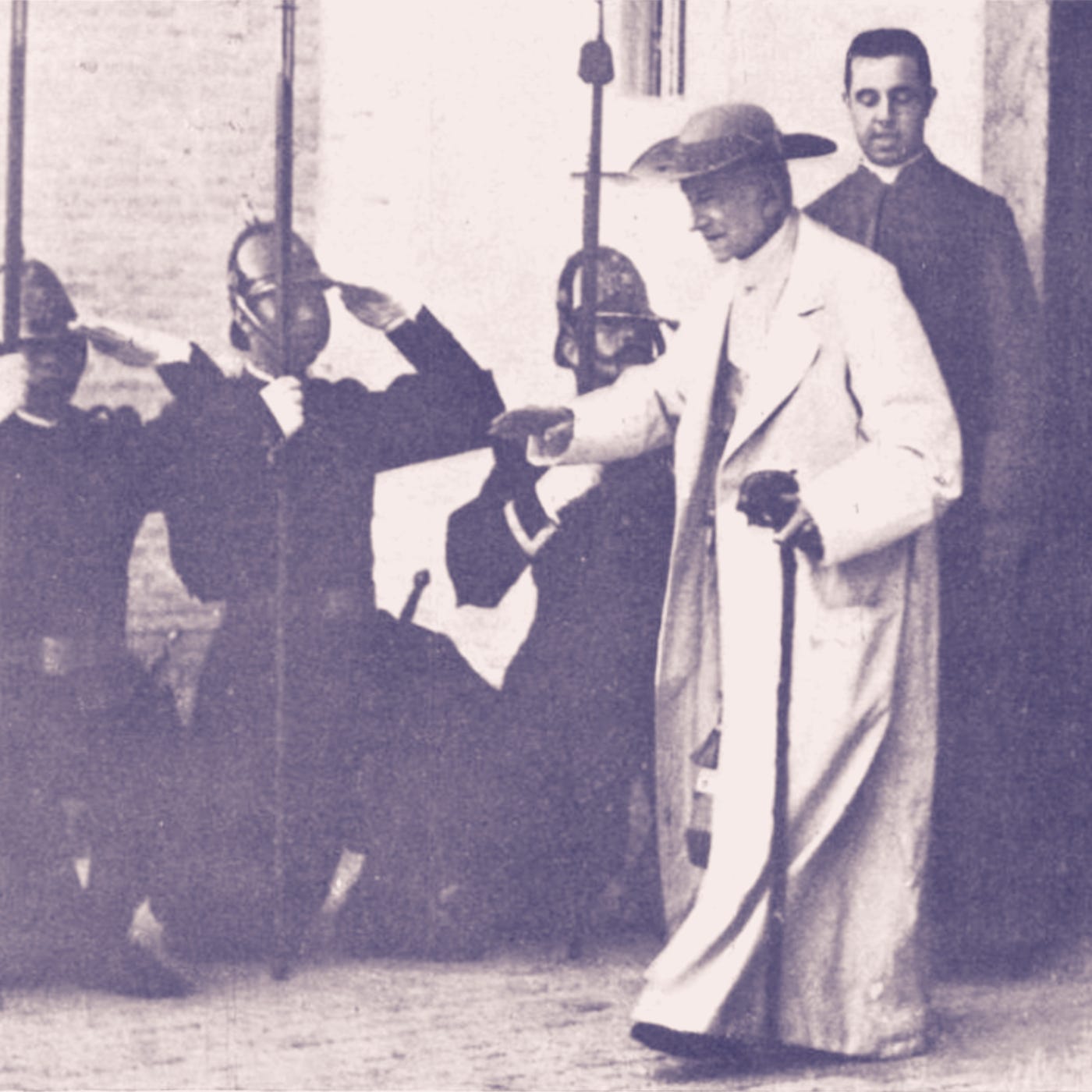Refuting the Protestant Reformation...1000 years early?
And Pope Leo XIII releases an encyclical on the Holy Rosary...with words that eerily apply to our own day
Today in Papal History is back! Sincerest apologies for the extended hiatus. There have been many fruitful and exciting changes on the home front these past several months that nevertheless precluded me from being able to dedicate the time necessary for these posts, but I hope to begin writing this with greater regularity going forward. Thank you again for reading and subscribing!
530 A.D.
On this day nearly 1500 years ago, the 53rd successor of St. Peter – Pope St. Felix IV – died at the young age of 40.
Felix, who happened to only be the third legitimate pope of that name (“Felix II” was, in fact, an antipope who was mistakenly included in the list at that time), is a prime example of playing the cards one is dealt. The ruling class of the time was still very much Arian – a heretical belief that Jesus Christ was merely a man, not both fully divine and fully human – and their king, the Goth Theodoric, had just finished imprisoning and murdering the prior pontiff, St. John I.
Felix held the rank of cardinal-priest at the time, and for reasons lost to history drew the eyes of Theodoric as the next man in line. Now technically, popes in those days were elected by acclaim of the Roman clergy and laity, but all too often the Eternal City’s civil rulers made their desires felt. So it was in this case, as well, as Theodoric impressed his desire onto the Romans and got them to elect Felix on July 12, 526.
Much to Theodoric’s dismay, however, Felix was far from being the company man that one would assume the king had hoped he’d be. Instead, as the Catholic Encyclopedia recounts, Felix “took advantage of the favor he enjoyed at the court of Theodoric to further the interests of the Roman Church, discharging the duties of his office in a most worthy manner.”
Theodoric himself wouldn’t actually be alive much longer, succumbing to old age not two months into Felix’s reign. The king’s grandson was next in line to the throne, but given his minor status, the king’s daughter, Amalsathuna, acted as queen regent in her son’s place.
Amalsathuna, as it happened, was reportedly favorable to Catholics (as opposed to the Arians) and made several rulings in the law that reflected her sentiment. She also was very generous to Felix, receiving from her as a gift two Ancient Roman structures – the Temple of Romulus and, right next door, the Templum sacroe urbis, the Roman land registry office.
Felix promptly had the buildings turned into the Church of Ss. Cosmas & Damian –two physicians and Christian martyrs in the Diocletian persecution – which can still be visited today. The mosaic in the apse depicts the two saints, along with Felix himself.

Felix’s other lasting impression on history comes from a series of teachings he sent to bishops in Gaul, who were still dealing with the fallout from Pelagianism – a heresy refuted by St. Augustine in the prior century, which taught that salvation could be gained solely by a man’s works, and without God’s grace. The letters, referred to as Capitula (Latin for “chapters”), ended up becoming the approved canons of the Council of Orange in 529, and were cited heavily to refute Martin Luther’s teachings on grace at the Council of Trent 1000 years later.
Here are just a few snippets from the canons from the Council of Orange:
Canon 18: Grace is not preceded by merit. Recompense is due to good works if they are performed; but grace, to which we have no claim, precedes them, to enable them to be done.
Canon 20: A man can do no good without God. God does much that is good in a man that the man does not do; but a man does nothing good for which God is not responsible, so as to let him do it.
Canon 25: Concerning the love with which we love God. It is wholly a gift of God to love God. He who loves, even though he is not loved, allowed himself to be loved. We are loved, even when we displease him, so that we might have means to please him. For the Spirit, whom we love with the Father and the Son, has poured into our hearts the love of the Father and the Son (Rom. 5:5).
Felix was only pope for four short years, after having fallen gravely ill in the early months of the year 530. A political dispute was afoot in those days such that Felix wanted to prevent the sort of civil meddling in ecclesiastical affairs, so he attempted to name his own successor prior to his own death. Although his choice – the future Pope Boniface II – did indeed end up the legitimate Bishop of Rome, it wasn’t without a fight, as his choice was disregarded soon after his death.
St. Felix IV is buried in the portico of St. Peter’s Basilica in Rome, and his feast day is celebrated on January 30.
1891 A.D.
In other papal history, today also marks the anniversary of Pope Leo XIII releasing an encyclical on the Holy Rosary – Octobri Mense – in which the words he writes sound strangely applicable to our own day:
1b. Universal and well-known are the evils we deplore: war made upon the sacred dogmas which the Church holds and transmits; derision cast upon the integrity of that Christian morality which she has in keeping; enmity declared, with the impudence of audacity and with criminal malice, against the very Christ, as though the Divine work of Redemption itself were to be destroyed from its foundation-that work which, indeed, no adverse power shall ever utterly abolish or destroy.
2. No new events are these in the career of the Church militant. Jesus foretold them to His disciples. That she may teach men the truth and may guide them to eternal salvation, she must enter upon a daily war; and throughout the course of ages she has fought, even to martyrdom, rejoicing and glorifying herself in nothing more than in the occasion of signing her cause with her Founder's blood, the sure and certain pledge of the victory whereof she holds the promise. Nevertheless we must not conceal the profound sadness with which this necessity of constant war afflicts the righteous.
It is indeed a cause of great sorrow that so many should be deterred and led astray by error and enmity to God; that so many should be indifferent to all forms of religion, and should finally become estranged from faith; that so many Catholics should be such in name only, and should pay to religion no honour or worship. And still sadder and more beset with anxieties grows the soul at the thought of the fruitful source of most manifold evils existing in the organisation of States that allow no place to the Church, and that oppose her championship of holy virtue.
This is truly a terrible manifestation of the just vengeance of God, Who allows blindness of soul to darken upon the nations that forsake Him. These are evils that cry aloud, that cry of themselves with a daily increasing voice. It is absolutely necessary that the Catholic voice should also call to God with unwearied instance, "without ceasing;"(1) that the Faithful should pray not only in their own homes, but in public, gathered together under the sacred roof; that they should beseech urgently the all-foreseeing God to deliver the Church from evil men and to bring back the troubled nations to good sense and reason, by the light and love of Christ.
3. Wonderful and beyond hope or belief is this. The world goes on its laborious way, proud of its riches, of its power, of its arms, of its genius; the Church goes onward along the course of ages with an even step, trusting in God only, to Whom, day and night, she lifts her eyes and her suppliant hands. Even though in her prudence she neglects not the human aid which Providence and the times afford her, not in these does she put her trust, which rests in prayer, in supplication, in the invocation of God.
Thus it is that she renews her vital breath; the diligence of her prayer has caused her, in her aloofness from worldly things and in her continual union with the Divine will, to live the tranquil and peaceful life of Our very Lord Jesus Christ; being herself the image of Christ, Whose happy and perpetual joy was hardly marred by the horror of the torments He endured for us.
Forgive me for being a sucker for flowery language from these old timey documents, but doesn’t this sound like it could have been written yesterday? It’s yet another example of how the Church and the world, in every age, seem to be at risk of burning to the ground at any moment. And yet, hope remains.
You can read the rest of Leo XIII’s great work here.




